flat tire TOYOTA RAV4 EV 2012 1.G Owners Manual
[x] Cancel search | Manufacturer: TOYOTA, Model Year: 2012, Model line: RAV4 EV, Model: TOYOTA RAV4 EV 2012 1.GPages: 520, PDF Size: 8.29 MB
Page 1 of 520
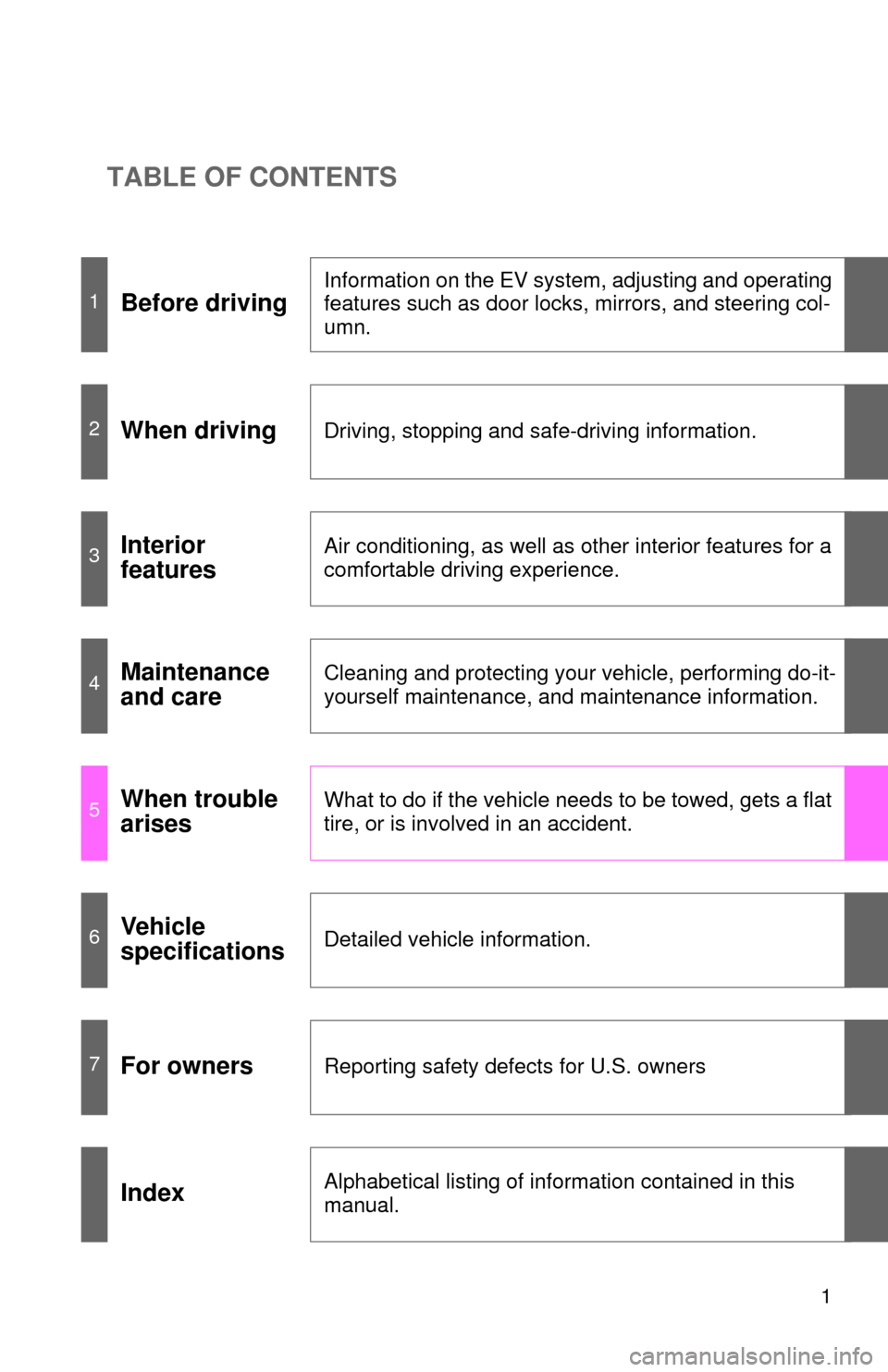
TABLE OF CONTENTS
1
1Before driving
Information on the EV system, adjusting and operating
features such as door locks, mirrors, and steering col-
umn.
2When drivingDriving, stopping and safe-driving information.
3Interior
featuresAir conditioning, as well as other interior features for a
comfortable driving experience.
4Maintenance
and careCleaning and protecting your vehicle, performing do-it-
yourself maintenance, and maintenance information.
5When trouble
arisesWhat to do if the vehicle needs to be towed, gets a flat
tire, or is involved in an accident.
6Vehicle
specificationsDetailed vehicle information.
7For ownersReporting safety defects for U.S. owners
IndexAlphabetical listing of information contained in this
manual.
Page 4 of 520

TABLE OF CONTENTSIndex
4
3-4. Other interior featuresSun visors .......................... 304
Vanity mirrors ..................... 305
Power outlets ..................... 306
Seat heaters ....................... 310
Armrest............................... 313
Coat hooks ......................... 314
Assist grips ......................... 315
Floor mat ............................ 316
Luggage compartment features ............................ 317
Garage door opener ........... 320
Safety Connect................... 326
4-1. Maintenance and care Cleaning and protecting the vehicle exterior ........... 334
Cleaning and protecting the vehicle interior ............ 337
4-2. Maintenance Maintenance requirements .................... 340
General maintenance ......... 342 4-3. Do-it-yourself maintenance
Do-it-yourself service precautions ....................... 346
Hood ................................... 349
Positioning a floor jack........ 351
Motor compartment ............ 355
Tires.................................... 366
Tire inflation pressure ......... 374
Wheels................................ 378
Air conditioning filter ........... 381
Electronic key battery ......... 383
Checking and replacing fuses ................................. 385
Headlight aim...................... 398
Light bulbs .......................... 400
5-1. Essential information Emergency flashers ............ 412
If your vehicle needs to be towed ........................... 413
If you think something is wrong ............................ 416
4Maintenance and care
5When trouble arises
Page 5 of 520

1
2
3
4
5
6
7
5
5-2. Steps to take in an emergency
If a warning light turns on or a warning buzzer
sounds... .......................... 417
If a warning message is displayed........................... 427
If you have a flat tire............ 447
If the EV (Electric Vehicle) system will not start .......... 465
If you lose your keys ........... 467
If the electronic key does not operate properly.......... 468
If the vehicle 12-volt battery is discharged......... 470
If your vehicle overheats ..... 475
If the vehicle becomes stuck ................................. 477
If your vehicle has to be stopped in an
emergency ........................ 479
6-1. Specifications Maintenance data (fluid capacity, etc.) ........... 482
Tire information ................... 489
6-2. Customization Customizable features ........ 500
6-3. Initialization Items to initialize ................. 503 Reporting safety defects
for U.S. owners ................ 506
Abbreviation list ........................ 508
Alphabetical index .................... 509
What to do if... .......................... 518
6Vehicle specifications
7For owners
Index
Page 7 of 520
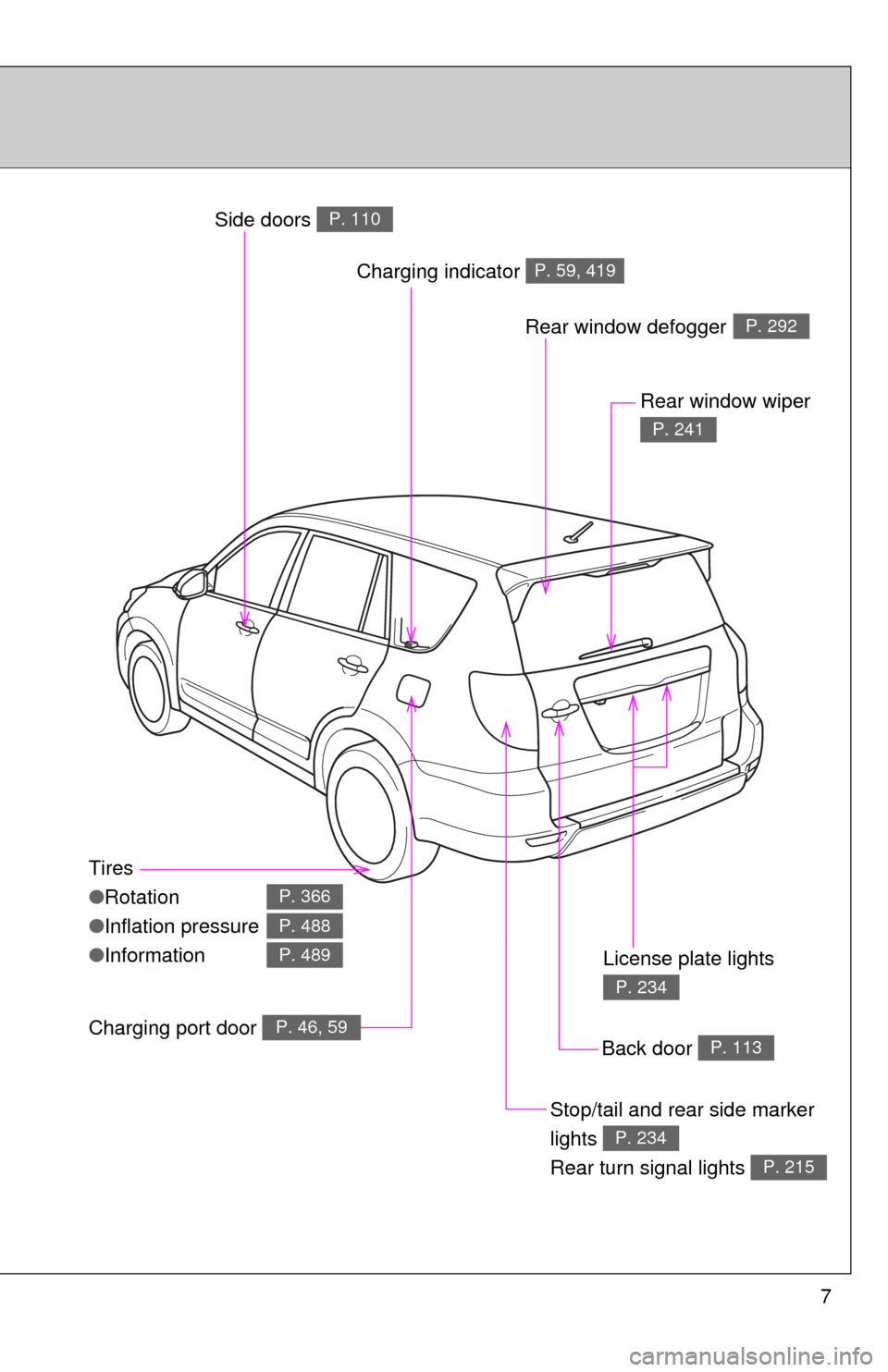
7
Tires
●Rotation
● Inflation pressure
● Information
P. 366
P. 488
P. 489
Back door P. 113
Stop/tail and rear side marker
lights
Rear turn signal lights
P. 234
P. 215
Rear window wiper
P. 241
License plate lights
P. 234
Side doors P. 110
Rear window defoggerP. 292
Charging indicator P. 59, 419
Charging port door P. 46, 59
Page 42 of 520
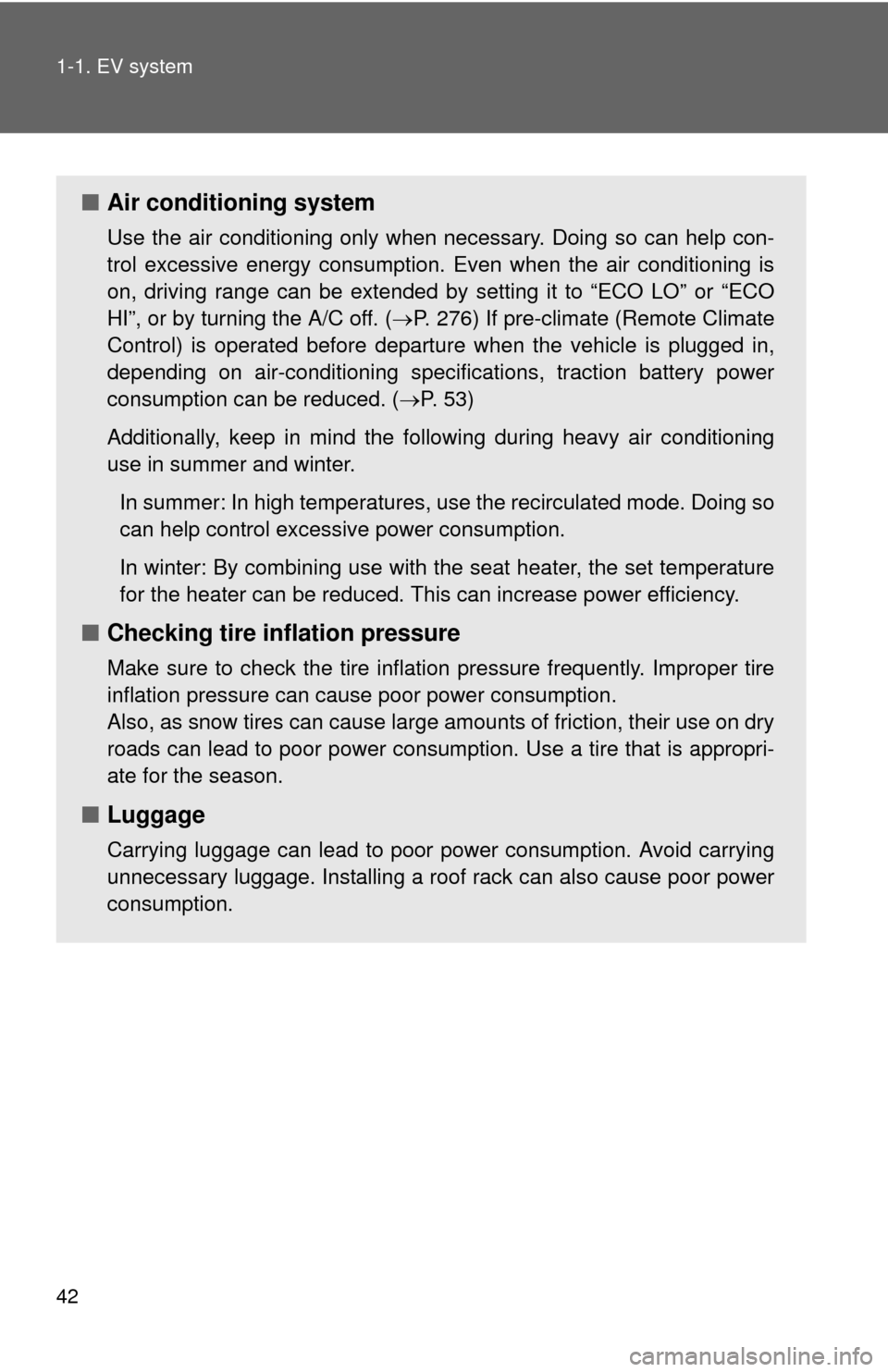
42 1-1. EV system
■Air conditioning system
Use the air conditioning only when necessary. Doing so can help con-
trol excessive energy consumption. Even when the air conditioning is
on, driving range can be extended by setting it to “ECO LO” or “ECO
HI”, or by turning the A/C off. ( P. 276) If pre-climate (Remote Climate
Control) is operated before departure when the vehicle is plugged in,
depending on air-conditioning specifications, traction battery power
consumption can be reduced. ( P. 53)
Additionally, keep in mind the following during heavy air conditioning
use in summer and winter. In summer: In high temperatures, use the recirculated mode. Doing so
can help control excessive power consumption.
In winter: By combining use with the seat heater, the set temperature
for the heater can be reduced. This can increase power efficiency.
■ Checking tire inflation pressure
Make sure to check the tire inflation pressure frequently. Improper tire
inflation pressure can cause poor power consumption.
Also, as snow tires can cause large amounts of friction, their use on dry
roads can lead to poor power consumption. Use a tire that is appropri-
ate for the season.
■Luggage
Carrying luggage can lead to poor power consumption. Avoid carrying
unnecessary luggage. Installing a roof rack can also cause poor power
consumption.
Page 198 of 520

198 2-1. Driving procedures
NOTICE
■When driving the vehicle
●Do not depress the accelerator and brake pedals at the same time during
driving, as this may restrain driving torque.
● Do not use the accelerator pedal or depress the accelerator and brake
pedals together to hold the vehicle on a hill.
■ Avoiding damage to vehicle parts
●Do not turn the steering wheel fully in either direction and hold it there for
an extended period of time.
Doing so may damage the power steering motor.
● When driving over bumps in the road, drive as slowly as possible to avoid
damaging the wheels, underside of the vehicle, etc.
■ If you get a flat tire while driving
A flat or damaged tire may cause the following situations. Hold the steering
wheel firmly and gradually press the brake pedal to slow down the vehicle.
●It may be difficult to control your vehicle
● The vehicle will make abnormal sounds
● The vehicle will behave abnormally
Information on what to do in case of a flat tire ( P. 447)
Page 254 of 520
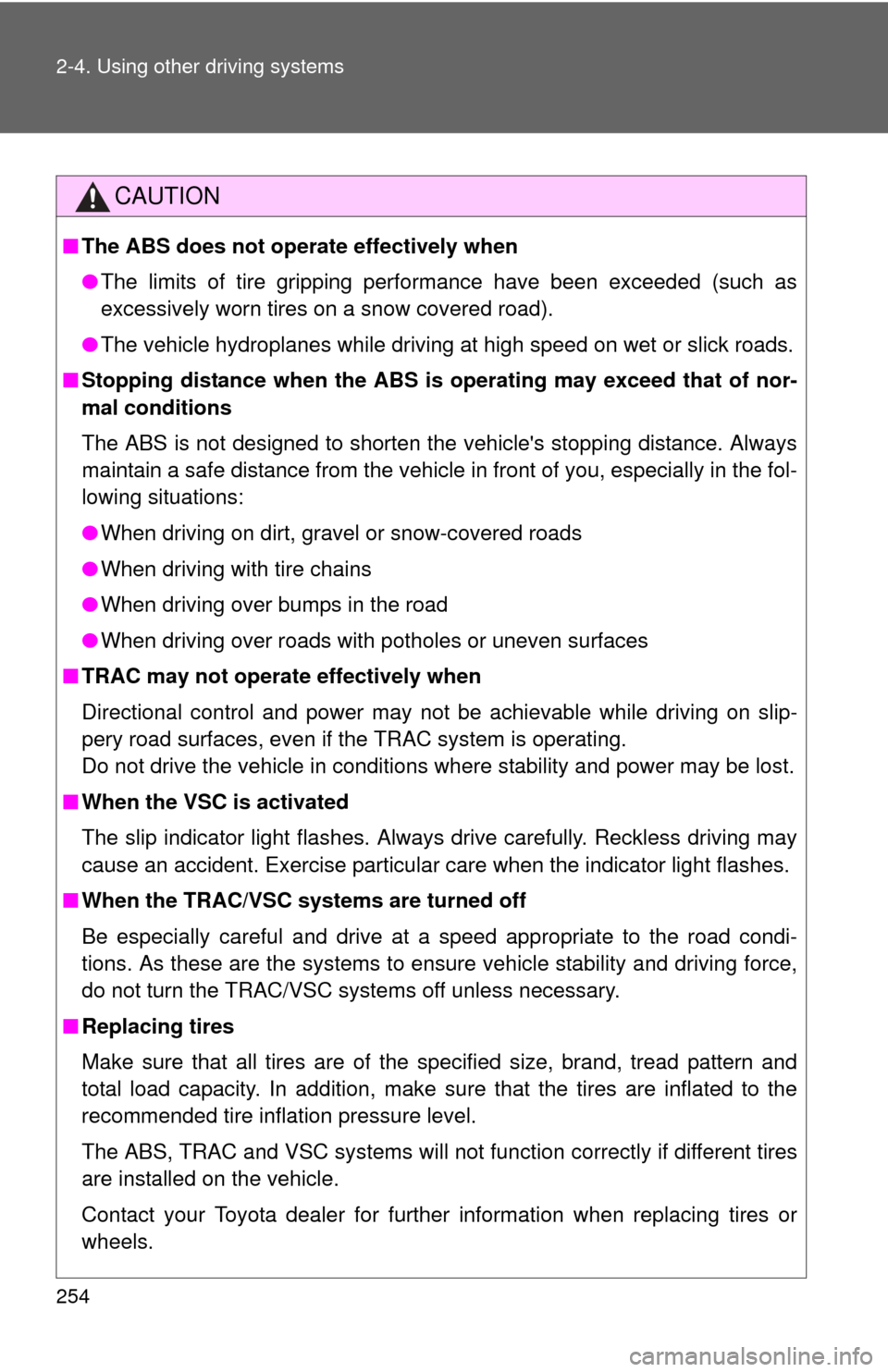
254 2-4. Using other driving systems
CAUTION
■The ABS does not operate effectively when
●The limits of tire gripping performance have been exceeded (such as
excessively worn tires on a snow covered road).
● The vehicle hydroplanes while driving at high speed on wet or slick roads.
■ Stopping distance when the ABS is operating may exceed that of nor-
mal conditions
The ABS is not designed to shorten the vehicle's stopping distance. Always
maintain a safe distance from the vehicle in front of you, especially in the fol-
lowing situations:
● When driving on dirt, gravel or snow-covered roads
● When driving with tire chains
● When driving over bumps in the road
● When driving over roads with potholes or uneven surfaces
■ TRAC may not operate effectively when
Directional control and power may not be achievable while driving on slip-
pery road surfaces, even if the TRAC system is operating.
Do not drive the vehicle in conditions where stability and power may be lost.
■ When the VSC is activated
The slip indicator light flashes. Always drive carefully. Reckless driving may
cause an accident. Exercise particular care when the indicator light flashes.
■ When the TRAC/VSC syst ems are turned off
Be especially careful and drive at a speed appropriate to the road condi-
tions. As these are the systems to ensure vehicle stability and driving force,
do not turn the TRAC/VSC systems off unless necessary.
■ Replacing tires
Make sure that all tires are of the specified size, brand, tread pattern and
total load capacity. In addition, make sure that the tires are inflated to the
recommended tire inflation pressure level.
The ABS, TRAC and VSC systems will not function correctly if different tires
are installed on the vehicle.
Contact your Toyota dealer for further information when replacing tires or
wheels.
Page 330 of 520

330 3-4. Other interior features
■Stolen Vehicle Location
If your vehicle is stolen, Safety Connect can work with local author-
ities to assist them in locating and recovering the vehicle. After fil-
ing a police report, call the Safety Connect response center at 1-
800-331-4331 and follow the prompts for Safety Connect to initiate
this service.
In addition to assisting law enforc ement with recovery of a stolen
vehicle, Safety-Connect-equipped vehicle location data may, under
certain circumstances, be shared with third parties to locate your
vehicle. Further information is available at Toyota.com.
■ Emergency Assistance Button (“SOS”)
In the event of an emergency on the road, push the “SOS” button
to reach the Safety Connect response center. The answering
agent will determine your vehicl e’s location, assess the emer-
gency, and dispatch the necessary assistance required.
If you accidentally press the “SOS” button, tell the response-center agent
that you are not experiencing an emergency.
■ Enhanced Roadside Assistance
Enhanced Roadside Assistance adds GPS data to the already
included warranty-based Toyota roadside service.
Subscribers can press the “SOS” button to reach a Safety Connect
response-center agent, who can help with a wide range of needs,
such as: towing, flat tire, etc. For a description of the Enhanced
Roadside Assistance services and their limitations, please see the
Safety Connect Terms and Conditions, which are available at
To y o t a . c o m .
Page 333 of 520
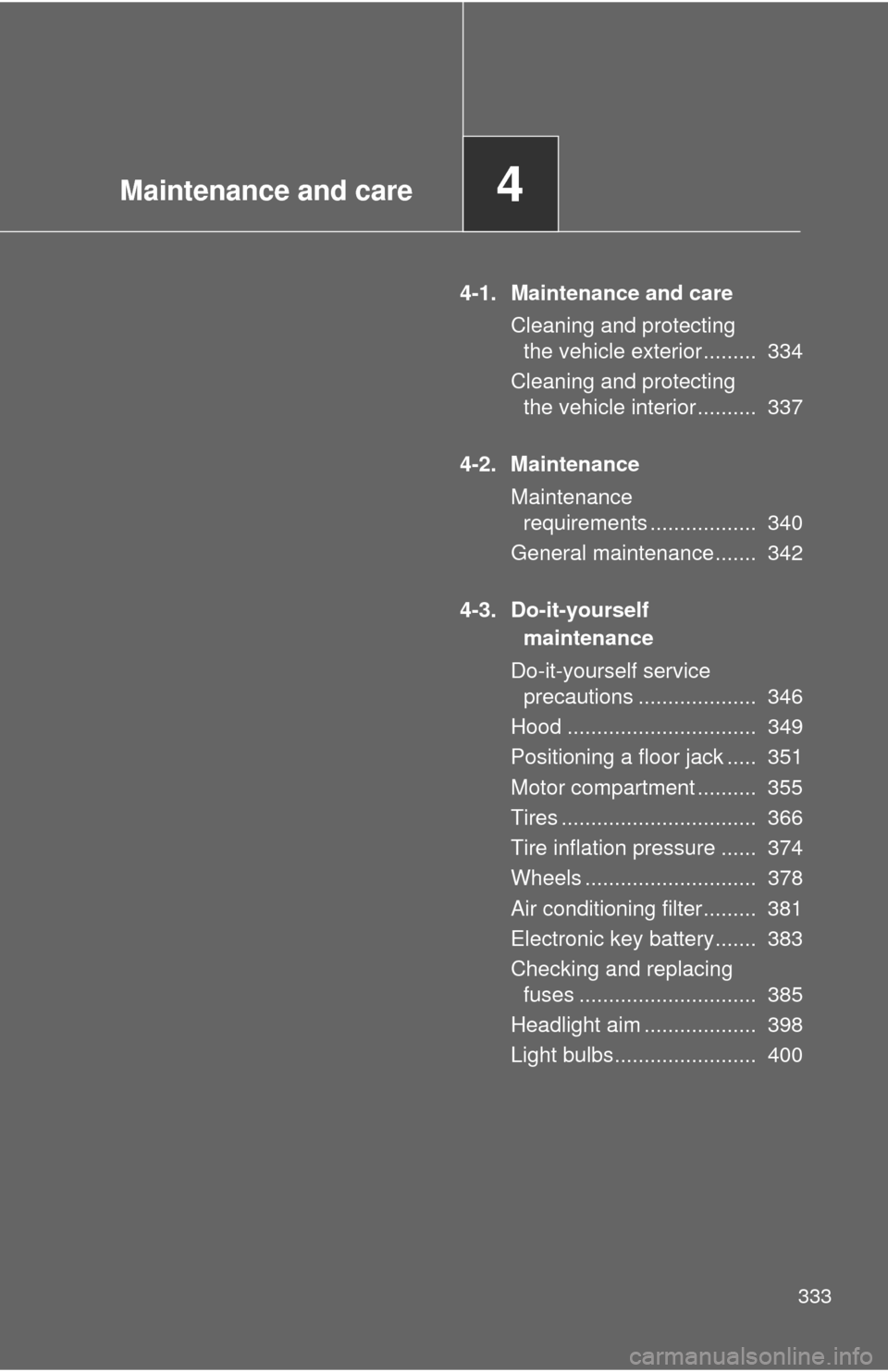
Maintenance and care4
333
4-1. Maintenance and careCleaning and protecting the vehicle exterior ......... 334
Cleaning and protecting the vehicle interior .......... 337
4-2. Maintenance Maintenance requirements .................. 340
General maintenance....... 342
4-3. Do-it-yourself maintenance
Do-it-yourself service precautions .................... 346
Hood ................................ 349
Positioning a floor jack ..... 351
Motor compartment .......... 355
Tires ................................. 366
Tire inflation pressure ...... 374
Wheels ............................. 378
Air conditioning filter......... 381
Electronic key battery....... 383
Checking and replacing fuses .............................. 385
Headlight aim ................... 398
Light bulbs........................ 400
Page 345 of 520

345
4-2. Maintenance
4
Maintenance and care
Vehicle exterior
ItemsCheck points
Doors • Do the doors operate smoothly?
Hood • Does the hood lock system work
properly?
Fluid leaks • There should not be any signs of
fluid leakage after the vehicle has
been parked.
Tires • Is the tire inflation pressure cor-
rect?
• The tires should not be dam- aged or excessively worn.
• Have the tires been rotated according to the maintenance
schedule?
• The wheel nuts should not be loose.